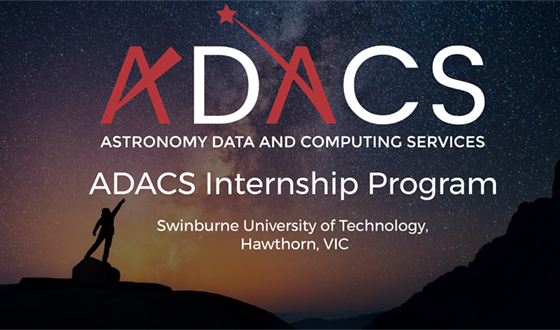
ADACS Internship Program 2018 – Call for Applications
Call for Applications
ADACS Internship Program 2018
Astronomy Data and Computing Services (ADACS) is an initiative by Astronomy Australia Limited (AAL) aiming to provide astronomy-focused training, support and expertise to allow Australian astronomers to maximise the scientific return from their data and computing infrastructure. A principal component of this initiative is to empower the astronomy community to harness the potential of the next generation telescopes and astronomy simulations. Internships and hands-on experience are essential parts of our training services. They aim to give users with an intermediate to advanced level of computing expertise the hands-on experience required to progress their skills further or seek alternative career paths (if they choose to do so).
The next round of this internship program is now open for applications. We expect to have up to two successful applicants in this round. These applicants will work on a project for up to three months and will be based at the ADACS Swinburne node in Melbourne. ADACS will provide a weekly stipend at a rate similar to that of a PhD scholarship. Additional support for applicants who do not reside in Melbourne can be considered.
We aim to provide the successful applicants with a realistic experience of working in a professional software development environment. In addition to the technical experience to be gained from working on projects associated with first-class computational and visualization facilities the applicants will also develop first-hand experience of working in an Agile project management framework.
Below we outline two potential projects that are available for the internships and the skill areas that are applicable to these projects. We would like to emphasise that the internships do not necessarily need to be limited to these projects. For example, ADACS operates a merit-based software and development service to the astronomy community and opportunities may exist to work with an ADACS developer on one of these projects. There is also the potential to shape a project to meet the skill-set and/or interests of the applicant.
Potential Project 1: Large-scale Visualisation for ASKAP Data Cubes
This project is a collaboration between ADACS, the Advanced Visualisation Laboratory at Swinburne and the ASKAP WALLABY science team.
Astronomy has now entered to “Big Data” era where multi-wavelength spectral surveys are presenting new challenges for visualisation, analysis and discovery. A prime example is the WALLABY survey which will use the Australian Square Kilometre Array Pathfinder (ASKAP) to provide resolved spectral imaging of many 1000s of galaxies. This project will take an existing tera-scale interactive visualisation and data-analysis framework (GraphTIVA) and make it readily available to meet the data science challenges faced by the WALLABY survey today and into the future.
Relevant skills:
- C/C++
- Python
- Experience working with a linux operating system.
Potential Project 2: Enhancement of the OzSTAR User Experience
This project is a collaboration between ADACS, Swinburne IT Services and the Swinburne Data Science Research Institute.
OzSTAR is the new supercomputer at Swinburne launched in 2018 and operates as a national facility for the astronomy community. Working closely with high-performance computing (HPC) experts within ADACS various opportunities exist to work on development projects aimed at enhancing the services available to the users of OzSTAR. For example, to develop a tool to pass information on HPC jobs to the account management system (the User Portal) so that through this portal users can generate and visualise statistics on their OzSTAR usage. This project will enable the intern to develop skills in the areas of data science and data visualisation while providing real benefit for all users of the OzSTAR facility.
Relevant skills:
- Python/Django
- HTML5/JS/React.Js
- Experience working with a linux operating system.
How to Apply?
Applications are due by 5 PM AEST Friday 20th April 2018. Please send your applications to jhurley@swin.edu.au making sure to include:
– a one-page cover letter outlining your strengths and suitability for the internship;
– a CV of maximum four-pages.
Please do contact ADACS (using the email address given above) if you have any queries about the program prior to making an application.
ADACS encourages applications from everyone with the appropriate expertise and skills. ADACS has a strong commitment to equity and diversity. We encourage applications from female and minority candidates.
Disclaimer: The nationality of the candidate nationality and their work/student rights in Australia may impact our ability to accept some applications. Please contact the local HDR team of your university to check if you can accept such an internship opportunity or not. Please feel free to contact us and get our team involved as early as you want.
ADACS is a collaboration between Swinburne University of Technology, Curtin University, and the Pawsey Supercomputing Centre. It is funded under the Astronomy National Collaborative Research Infrastructure Strategy (NCRIS) Program via Astronomy Australia Ltd (AAL).
